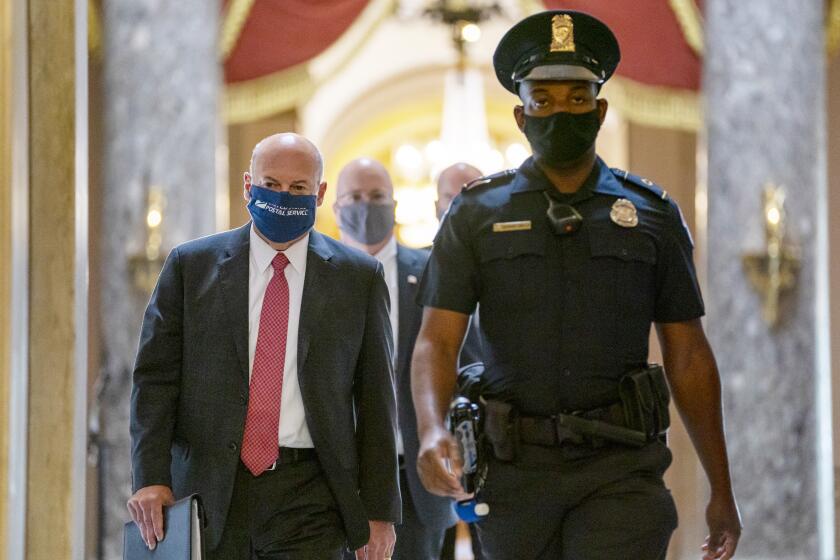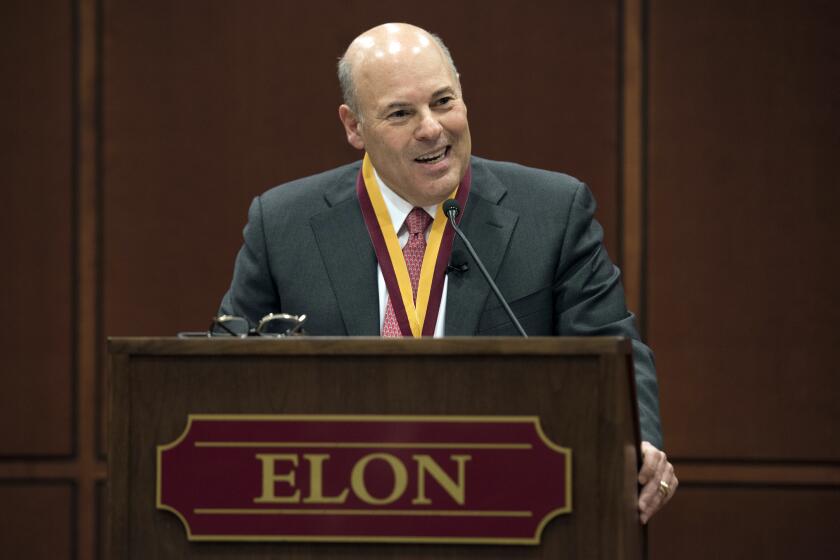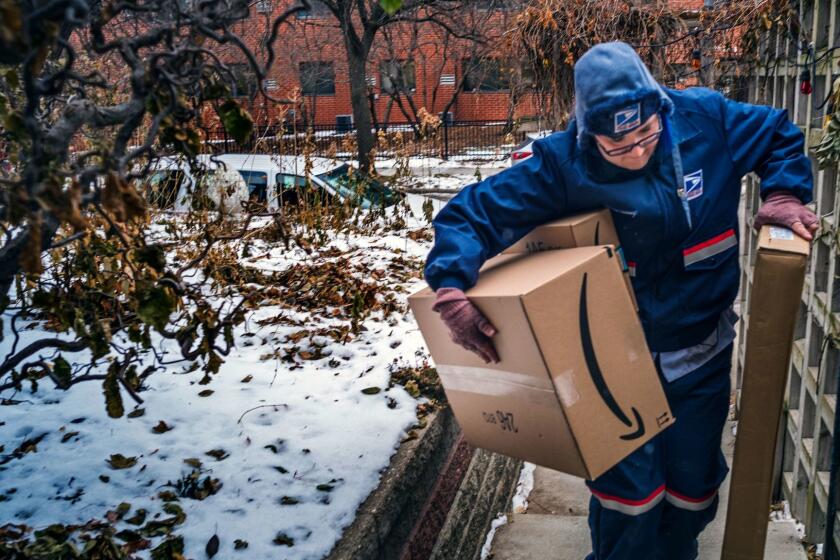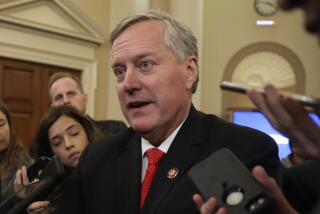Column: DeJoy’s appointment as postmaster general looks even more dishonest than you thought
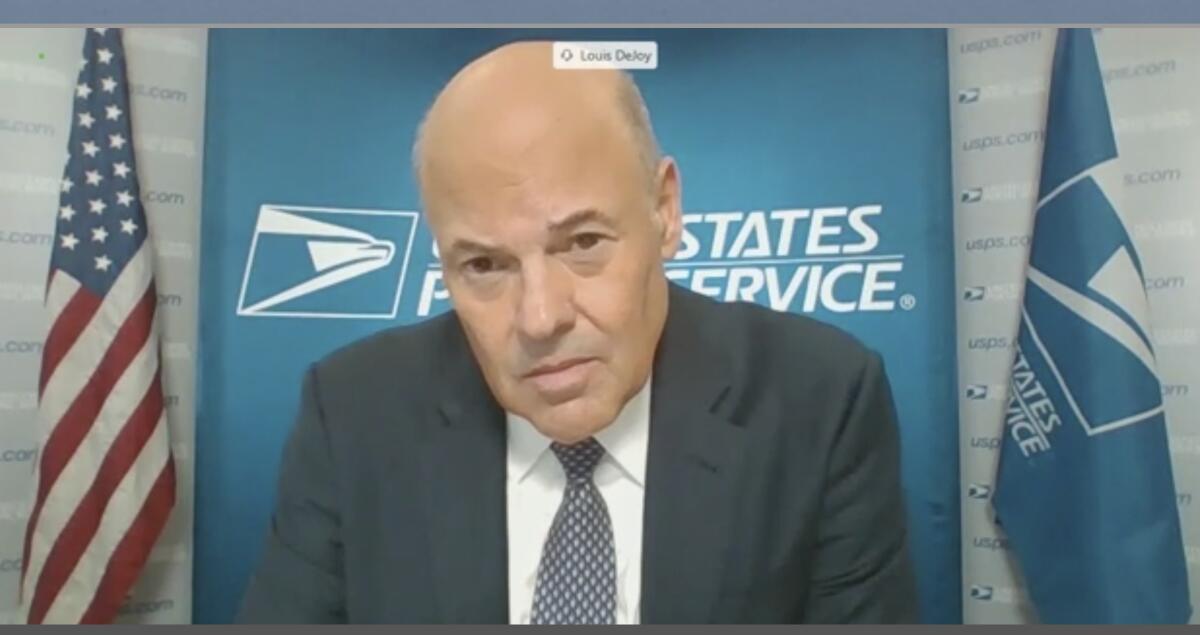
For anyone concerned about the manifest slowdown of mail at the U.S. Postal Service or who watched the uninformative performance of Postmaster General Louis DeJoy before a Senate committee Friday, the following question has become more urgent:
How did this guy get his job?
Thus far, speculation about the appointment of DeJoy, who assumed his job in mid-June, has focused on his role as a major fundraiser for President Trump and the fact that he is the first postmaster general in some two decades to not have any experience with the USPS.
He didn’t strike me as a serious candidate.
— Former USPS Governor David Williams, about Postmaster General Louis DeJoy
But congressional testimony this week by David Williams, a former USPS inspector general and former vice chairman of the service’s board of governors, put some meat on those bare bones.
Williams told the Congressional Progressive Caucus that he resigned from the USPS board when it became clear it was about to appoint DeJoy.
He says DeJoy’s name came to the board outside the normal route, which went through the headhunting firm Russell Reynolds. Instead it came from board member John M. Barger, a Southern California investment executive who was supervising the postmaster search.
Barger told the board he had had lunch with DeJoy and “wanted to move his name forward,” Williams said. “It wasn’t clear how [Barger] had met Mr. DeJoy to me, and I don’t think anyone was clear on it.”
Determining how DeJoy landed his post is important because of signs that the effectiveness of the USPS has crumbled in the roughly two months that he has been in charge.
If you want a picture of how badly service has been affected by management and policy changes imposed by DeJoy, my colleagues Laura J. Nelson and Maya Lau have spelled them out in an absolutely harrowing report about chaos on the postal floor.
Then there’s DeJoy’s appearance Friday before the Senate Committee on Homeland Security.
There he seemed to oscillate between claiming that his operational changes were mandated by the need to impose operational efficiencies on the service and asserting that he was unfamiliar with some of the changes, including the removal of mailboxes in local communities and the scrapping of high-capacity mail-sorting machines at postal facilities.
The suspension of changes at the postal service doesn’t end the Trump threat to destroy the USPS
Asked what studies he had made of the impact of operational changes on seniors and veterans before bulling ahead, he couldn’t answer.
All this is taking place against the backdrop of the coronavirus pandemic and only months before a November election for which voting by mail appears likely to play an unprecedented role.
Williams testified that Treasury Secretary Steven Mnuchin had been steadily injecting himself into USPS operations well before DeJoy’s appointment, though he was unable to say whether Mnuchin played a direct role in the appointment.
Senate Minority Leader Charles E. Schumer has said he has evidence that Mnuchin interfered in the hiring process, but that the USPS has refused to waive confidentiality about the appointment. Mnuchin has said he played no role, according to Reuters.
DeJoy interviewed twice with the board, Williams said. The first time, DeJoy said “he wasn’t sure he wanted to take the job and used the entire time asking us questions about our intents and the job.” One governor even joked that if the board didn’t ask even a single question, the session wouldn’t qualify as an interview.
At the second interview, Williams said, Barger “actually helped him finish a number of sentences where he got stuck and in addition to that he explained to the board what Mr. DeJoy meant during the presentation.”
Barger didn’t respond to a request for comment sent through his Los Angeles investment firm, NorthernCross Partners.
Williams said of DeJoy: “He didn’t strike me as a serious candidate.”
Headhunting firm Russell Reynolds had brought forth several candidates who would have been vastly more qualified, he said, but he wasn’t aware that DeJoy was on their list. Although DeJoy had run a logistics company that had held a contract with the USPS, that was “narrow” expertise in terms of the demand on the postmaster general, Williams said.
Trump’s attack on the U.S. Postal Service goes beyond vandalism and undermines democracy.
Williams said that DeJoy did not appear to have received the background check normal for appointees to high government positions. That should have included an audit of a contract his former company had held with the USPS.
“It looked like there were concerns about whether his company was billing correctly and performing fully,” Williams said. “That contract file needs to be examined. ... We didn’t do that.”
A full background check might also have revealed DeJoy holdings worth at least $30 million in USPS competitors and contractors. In June, DeJoy also purchased options on Amazon stock that might rise in value if the USPS’ ability to compete with Amazon is hamstrung.
Williams said that he resigned from the USPS board in April after growing concerned over Mnuchin’s efforts to interfere in USPS operations. Only days later, the board appointed DeJoy as postmaster general.
“It became clear to me,” Williams testified, “that the administration was politicizing the postal service.” Mnuchin “insisted that all Republican appointees to the board of governors and the Postal Regulatory Commission come to his office and ‘kiss the ring’ and receive his blessing before confirmation.”
All six sitting members of the board of governors are Trump appointees, though only four are Republicans. By law, no more than five can be members of the same party. Three seats are vacant, including the one vacated by Williams, a Democrat. Four of the five members of the Postal Regulatory Commission, which oversees USPS finances, are Trump appointees.
Mnuchin maintained contacts with the Republican members “away from the full board” after their confirmations, Williams said, and
“continued issuing orders and expressing approval and disappointment with their performance.”
Mnuchin was “keenly interested” in issues such as USPS labor agreements, postal price increases and contracts with its largest customers, Amazon, UPS and FedEx.
Taking advantage of his prerogative to comment on issues of government about which he has no apparent knowledge, President Trump last week Twitter-attacked the U.S.
Williams said that the USPS general counsel advised Mnuchin that his involvement with an independent government agency was illegal because “another department cannot impose its will on a department of the federal government ... but the concerns were ignored.”
Mnuchin’s interest partially reflected Trump’s obsession with the USPS, particularly its contract with Amazon. The giant online retailer was founded by Jeff Bezos, who also owns the Washington Post, a persistent Trump critic. Trump has asserted without foundation that the USPS loses money on the contract with Amazon and should raise the prices it charges Amazon and the other big shippers.
Mnuchin’s involvement intensified in the course of negotiations over pandemic relief Congress was planning to provide to the postal service. He issued proposed terms for a $15-billion line of credit from Congress that were “very intrusive. ... I hadn’t seen anything like it before.”
Mnuchin wanted to approve labor agreements, price changes and agreements with the large customers. He also urged that the USPS adopt a pricing model that had been proposed by UPS, and that Williams says would have been “ruinous for the postal service to adopt.”The model would have made the postal service uncompetitive in parcel delivery, “where we had been gaining market share.”
As we’ve reported, Congress ultimately gave Mnuchin wide latitude to set the terms of a $10-billion line of credit for the agency, including access to details about its contracts with the major shippers.
